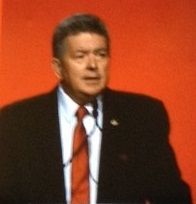Article
He Couldn't Save Dad: Steven Houser, PhD, on Heart Research
Author(s):
AHA President Steven Houser opens the AHA Scientific Sessions 2016 with a moving talk on his father's premature death from heart disease.

As physicians from around the globe converged on New Orleans’ Morial Convention Center, American Heart Association President Steven Houser, PhD, senior associate dean of research at Temple University in Philadelphia, opened the meeting this afternoon with a personal reflection on how he came to embrace cardiac research.
The story began with his father, a military veteran who picked up a smoking habit during his service and later developed heart disease.
“My dad smoked, he ate a diet that was not heart healthy—as I did—he had high cholesterol, and high blood pressure,” Houser recalled. Though his physicians did their best to care for him, Houser’s father died at age 51 of heart disease.
“I often wonder if he had been alive in this time if life would have been different,” Houser said, perhaps he could have helped him stop smoking, eat better, and get more exercise.
During his father’s illness, Houser (photo) spent much time in libraries, trying to keep up with what doctors knew and didn’t know, hoping to come up with something that would help.
He continued on that path, long after his father’s death, and came to see that the best chance for repairing damaged hearts may be in finding ways to regenerate myocytes. He shifted the focus of his research to pursue that line of inquiry.
The National Institutes of Health funders were not enthusiastic, Houser said, but eventually he parlayed a $7,500 grant he obtained with the help of the Philadelphia chapter of the AHA into multiple NIH grants, which to date have totaled $25 million.
It is significant, Houser said, that he is the first basic scientist to serve as AHA president.
“Life is why, but science is how,” Houser said, referring to the AHA’s motto on ending heart disease. “Community is where,” he added.
That means preventing heart disease, not only by complex and expensive research efforts by such commonplace measures as urging patients to walk, manage their diabetes, and watching their diet.
“Personally that means a brisk walk, less Philly cheese steaks, and in New Orleans, less beignets,” he said.
But research is his passion, he said, “And I am as passionate now as I was sitting at my dad’s bedside 40 years ago.”
He urged his colleagues and fellow meeting attendees to "Help someone live a life free of cardiovascular disease and stroke."




